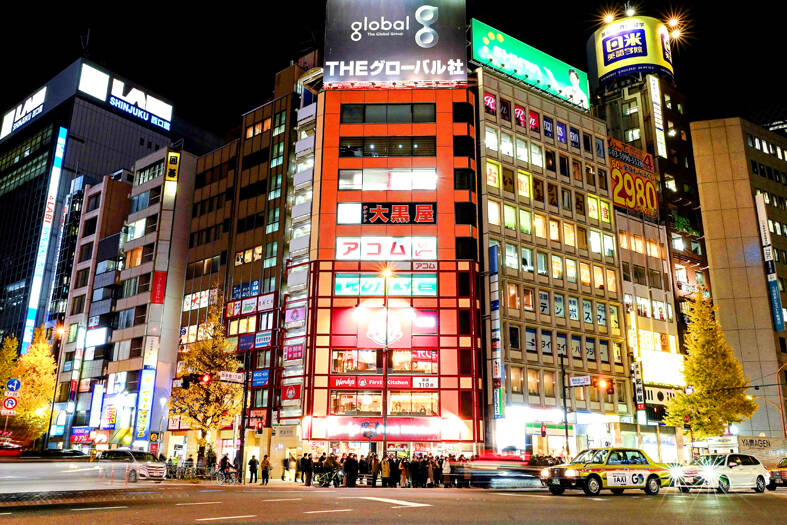Japanese authorities are investigating a report from a human rights group that China has set up police offices in Japan, a top government spokesperson said yesterday, following similar checks by European countries, the US and Canada.
Safeguard Defenders, an Asia-focused rights group based in Spain, has published two reports since September indicating that Chinese authorities have established 102 overseas police stations in 53 countries, including Japan.
Chinese authorities have dismissed the accusations and said the facilities are volunteer-run centers that help Chinese citizens renew documents and offer other services that were disrupted during the COVID-19 pandemic.

Photo: AFP
“We will take all necessary steps as we clarify the situation,” Japanese Chief Cabinet Secretary Hirokazu Matsuno told a news conference when asked about the government’s response to the report.
Matsuno earlier said that Japan had told Chinese authorities through diplomatic channels that “it would be unacceptable if there was any activity that violates Japan’s sovereignty.”
Safeguard Defenders said in a September report that police from the Chinese city of Fuzhou had set up a “service station” in Tokyo.
The group indicated in a follow-up report that China had another such station in the Japanese city of Nantong.
Japan’s investigation comes after similar checks by Western governments into the reports that alleged that the Chinese police were targeting Chinese nationals living abroad and pressuring some to return home to face criminal charges.

MONEY GRAB: People were rushing to collect bills scattered on the ground after the plane transporting money crashed, which an official said hindered rescue efforts A cargo plane carrying money on Friday crashed near Bolivia’s capital, damaging about a dozen vehicles on highway, scattering bills on the ground and leaving at least 15 people dead and others injured, an official said. Bolivian Minister of Defense Marcelo Salinas said the Hercules C-130 plane was transporting newly printed Bolivian currency when it “landed and veered off the runway” at an airport in El Alto, a city adjacent to La Paz, before ending up in a nearby field. Firefighters managed to put out the flames that engulfed the aircraft. Fire chief Pavel Tovar said at least 15 people died, but

LIKE FATHER, LIKE DAUGHTER: By showing Ju-ae’s ability to handle a weapon, the photos ‘suggest she is indeed receiving training as a successor,’ an academic said North Korea on Saturday released a rare image of leader Kim Jong-un’s teenage daughter firing a rifle at a shooting range, adding to speculation that she is being groomed as his successor. Kim’s daughter, Ju-ae, has long been seen as the next in line to rule the secretive, nuclear-armed state, and took part in a string of recent high-profile outings, including last week’s military parade marking the closing stages of North Korea’s key party congress. Pyongyang’s official Korean Central News Agency (KCNA) released a photo of Ju-ae shooting a rifle at an outdoor shooting range, peering through a rifle scope

South Korea would soon no longer be one of the few countries where Google Maps does not work properly, after its security-conscious government reversed a two-decade stance to approve the export of high-precision map data to overseas servers. The approval was made “on the condition that strict security requirements are met,” the South Korean Ministry of Land, Infrastructure and Transport said. Those conditions include blurring military and other sensitive security-related facilities, as well as restricting longitude and latitude coordinates for South Korean territory on products such as Google Maps and Google Earth, it said. The decision is expected to hurt Naver and Kakao

Gaza is rapidly running out of its limited fuel supply and stocks of food staples might become tight, officials said, after Israel blocked the entry of fuel and goods into the war-shattered territory, citing fighting with Iran. The Israeli military closed all Gaza border crossings on Saturday after announcing airstrikes on Iran carried out jointly with the US. Israeli authorities late on Monday night said that they would reopen the Kerem Shalom crossing from Israel to Gaza yesterday, for “gradual entry of humanitarian aid” into the strip, without saying how much. Israeli authorities previously said the crossings could not be operated safely during